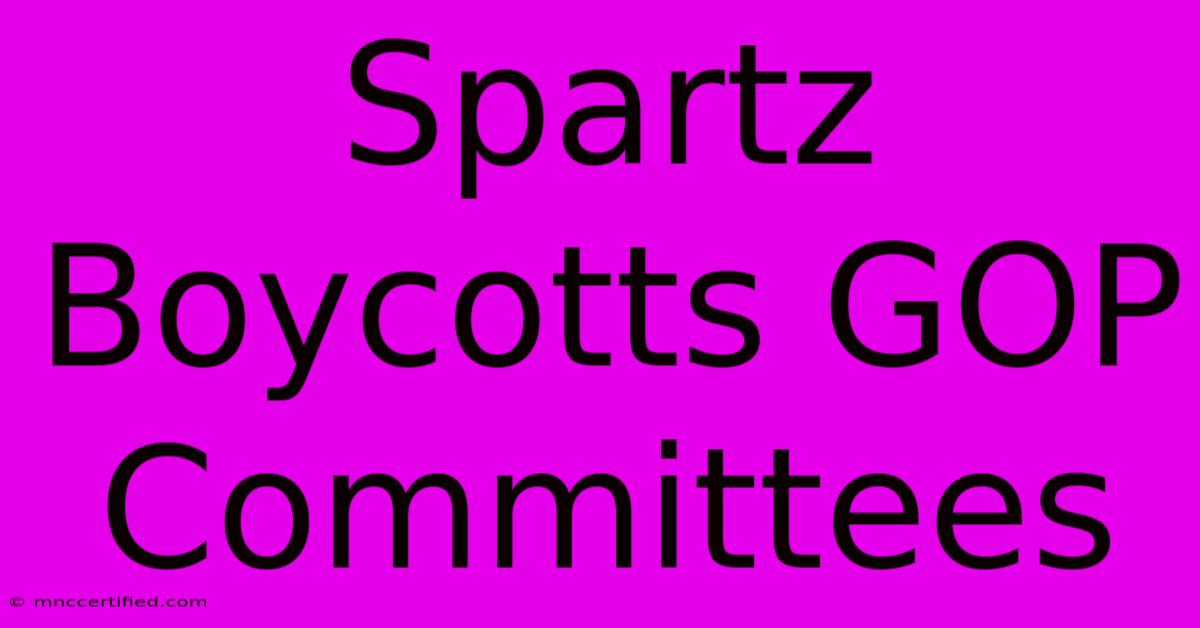Spartz Boycotts GOP Committees

Table of Contents
Spartz Boycotts GOP Committees: A Deep Dive into the Political Fallout
Indiana Representative Victoria Spartz's decision to boycott Republican Party committees has sent shockwaves through the political landscape. This seemingly simple act carries significant weight, revealing underlying tensions within the GOP and sparking intense debate about party unity and future strategies. This article will delve into the reasons behind Spartz's boycott, its implications for the Republican Party, and the broader political context surrounding this controversial move.
Understanding Spartz's Rationale: A Complex Web of Allegations
Spartz's boycott isn't rooted in a single grievance. Instead, it stems from a confluence of factors, primarily centered around allegations of financial mismanagement and a perceived lack of transparency within the Republican National Committee (RNC) and other party committees. While she hasn't explicitly detailed all her concerns, her public statements hint at a deeper dissatisfaction with the party's leadership and internal operations. She's suggested a need for greater accountability and a more thorough investigation into the party's finances, indicating a serious breach of trust.
Key Allegations Fueling the Boycott:
- Concerns about RNC spending: Spartz's concerns likely touch upon specific financial decisions made by the RNC, potentially involving campaign spending, fundraising activities, or other budgetary allocations. The specifics remain largely undisclosed, adding to the intrigue and speculation.
- Lack of transparency and accountability: This is a recurring theme in Spartz's criticisms. She's implied a lack of transparency in the RNC's financial reporting and decision-making processes, leading to a feeling that her concerns are being ignored. This lack of accountability is seen as undermining the integrity of the party.
- Internal power struggles: While not directly stated, Spartz's actions may reflect broader internal power struggles within the Republican Party. Her boycott could be interpreted as a challenge to the existing leadership structure and a call for reform.
Implications for the Republican Party: A Fractured Front?
Spartz's actions have significant implications for the Republican Party. Her boycott highlights existing fissures and internal conflicts, raising questions about party unity and its ability to present a cohesive front in the face of upcoming elections. The impact extends beyond internal politics:
- Damage to party image: The public perception of the GOP could be negatively affected by this highly publicized internal dispute. The perception of infighting and financial mismanagement can undermine voter confidence and potentially hurt election prospects.
- Weakened fundraising efforts: Spartz's actions could discourage donors who might hesitate to contribute to a party perceived as internally divided and lacking financial transparency.
- Strategic challenges: Internal conflicts can divert attention and resources away from more pressing strategic priorities, such as preparing for upcoming elections and developing coherent policy platforms.
The Broader Political Context: A Symptom of Deeper Issues?
Spartz's boycott isn't isolated. It reflects a broader trend of discontent within the Republican Party, particularly surrounding questions of leadership and accountability. This dissatisfaction isn't confined to a specific faction but may represent a more widespread sentiment among some Republican members and voters. Understanding this broader context is key to analyzing Spartz's actions:
- Growing calls for reform: Spartz's actions align with a growing chorus of voices within the Republican Party calling for greater transparency and accountability. This suggests a desire for significant changes in how the party is run.
- Impact on 2024 elections: The fallout from Spartz's boycott could significantly impact the 2024 election cycle. Internal divisions weaken the party's ability to effectively campaign and compete against the Democratic Party.
- Potential for wider repercussions: Other Republican members might be emboldened to express similar concerns or take similar actions, potentially escalating the internal conflict within the party.
Conclusion: A Turning Point for the GOP?
Victoria Spartz's boycott of GOP committees is more than a simple act of defiance. It's a symptom of deeper issues within the Republican Party, highlighting concerns about financial transparency, accountability, and internal unity. The long-term consequences of this action remain to be seen, but it undoubtedly represents a pivotal moment that could shape the future trajectory of the Republican Party. Whether this serves as a catalyst for genuine reform or further deepens the existing divisions remains to be seen. Only time will tell if Spartz's bold move will result in significant changes or simply exacerbate existing tensions.

Thank you for visiting our website wich cover about Spartz Boycotts GOP Committees. We hope the information provided has been useful to you. Feel free to contact us if you have any questions or need further assistance. See you next time and dont miss to bookmark.
Featured Posts
-
Janis Timma Father Speaks On Sons Passing
Dec 18, 2024
-
No Payment For Waspi Women
Dec 18, 2024
-
Guinness Supply Crisis In Uk
Dec 18, 2024
-
Bbc Sports Cavendish Speaks Out
Dec 18, 2024
-
Juventus Needs Cagliari Win Says Torricelli
Dec 18, 2024